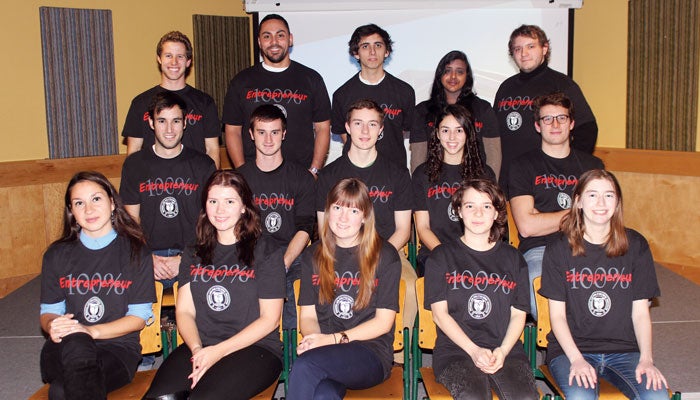
Some of the fall 2014 Change the World Challenge winners, representing 10 winning ideas from 76 entries.
A mobile application and website for tracking local infections, a biomedical device for developing drugs targeting treatment in the brain, and a wearable data collection platform that attaches to your eyeglasses are among the 10 winning ideas from the 76 entries in the fall 2014 Change the World Challenge at Rensselaer.
Established in 2005 by entrepreneur Sean O’Sullivan ’85, the Change the World Challenge competition has helped to validate new student ideas.
“For many aspiring entrepreneurs, transforming an idea into an actual product is a difficult hurdle to surmount,” said Thomas Begley, dean of the Lally School. “We are grateful to Sean O’Sullivan for his leadership in developing this award and competition that helps Rensselaer students have a transformative experience as they take on multifaceted challenges in society.”
The Change the World Challenge competition is a twice-yearly event for Rensselaer students created to support entrepreneurship education and inspire students to consider ways to improve the human condition. Each semester a $10,000 prize is shared by the winning students and student teams who develop innovative ideas and inventions. Patent application assistance is also given.
We are grateful to Sean O’Sullivan for his leadership in developing this award and competition that helps Rensselaer students have a transformative experience as they take on multifaceted challenges in society.”—Thomas Begley, dean of the Lally School
“We seek to constantly improve the opportunities for our students and do so using advanced technologies and concepts,” said Matt Cusack ’02, who serves as an entrepreneur-in-residence in the Paul J. ’69 and Kathleen M. Severino Center for Technological Entrepreneurship. “As such, we have begun to incorporate lean concepts into our entrepreneurship and innovation curricula, including the vibrant Change the World Challenge competition during the fall 2014 semester.”
The “Lean Launch Pad” approach is a method for improving the success rate in developing businesses and products. It has been developed by several veteran entrepreneurs and authors, including Steve Blank, Bob Dorf, Eric Ries, Alexander Osterwalder, Yves Pigneur, and Bill Aulet. Based on their previous experience working in several U.S. startups, the authors have demonstrated that startups can avoid common pitfalls, improve their odds of success, and shorten their product development cycles by adopting a combination of business-hypothesis-driven experimentation.
During the course of the six-week program, 19 teams comprised of 60 students focused on applying the lean start-up approach. Ten teams completed the challenge, with one honorable mention.
The 10 winning ideas:
1. Medificent a mobile application and website for tracking local infections, with the feature of online notifications. It is intended for parents and schools to help them keep track of the spreading of infections.
2. Background Screening a smart phone app that leverages people’s normal everyday activities while alerting them to abnormalities that they otherwise would not be aware of, giving them the opportunity for early medical detection and sustained life.
3. Culture-Shift a device designed to capture the critical physiological factors of vascular endothelial tissue to produce highly representative in vitro tissue models in high-capacity, while integrating with standard laboratory supplies, equipment, and experimental protocols.
4. Fire-Eye a new fire safety system that provides a method for predicting and preventing fires in your home before they occur. By utilizing an array of sensors strategically placed throughout your home, Fire-Eye can continuously map out thermal activity in each room, learn normal conditions, and identify abnormal hotspots in a room that could develop into a fire.
5. Invisible Friends a website and smartphone app that allows people with chronic digestive illnesses to track the connection between diet and symptoms.
6. Lightfeed a wearable electronic sensor that spectrally resolves the user’s ambient light exposure over time, helping lighting researchers uncover the ideal light settings required for those suffering from chronic sleep problems.
7. OrbitalTracking an alternative tracking technology to RFID that allows additional and improved functionality.
8. Park Now a product to improve the parking experience in large cities.
9. Quitli a wearable technology that brings the psychology of habit to the quantified self-movement by recording those moments when you’re not at your best, letting you visualize their frequency.
10. Mi Games a user-friendly dedicated communications tool that allows athletes to communicate with coaches, trainers, and nutritionists, as well as allowing for direct communication between the athletics department and the fans.


